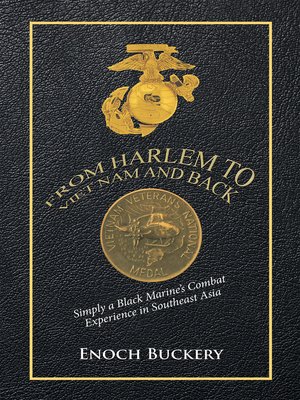From Harlem to Viet Nam and Back
ebook ∣ Simply a Black Marine's Combat Experience in Southeast Asia
By Enoch Buckery

Sign up to save your library
With an OverDrive account, you can save your favorite libraries for at-a-glance information about availability. Find out more about OverDrive accounts.
Find this title in Libby, the library reading app by OverDrive.



Search for a digital library with this title
Title found at these libraries:
| Loading... |
At the time, I was a twenty-year-old, wholesome, part-time business administration student of six credits at City University of New York, and also employed at the American Iron and Steel Institute as a sales expeditor, when my draft notice came from the U.S. Army. Twelve credits were necessary for a student's full deferment from the United States Military Draft. I was also newly married at the time, but I was mandated to report to Whitehall Street for induction. Three other draftees were also chosen with me, and we were directed to a separate room and given a test. Upon completion of the test we were then sworn in and congratulated, however, we were welcomed into the United States Marine Corps instead of the Army. The following morning, we reported to Paris Island, South Carolina for boot camp training and then on to chemical and jungle training at Camp Lejune, North Carolina. I was allowed a brief visit back home in New York before my transfer to the Marine Corps based at Camp Pendleton, California for advanced jungle training, where I received west pack orders in route to Viet Nam. The most feared orders a soldier could receive at the time were west pack orders, because that meant the soldier was headed to Viet Nam. Upon entering the Republic of Viet Nam—shortly after the Marine Corps boot camp training at Paris Island's extensive jungle training at Camp Pendleton, California—our orientation left us Marines with a somewhat superior mental complex that trained us to look down on the Viet Namese people, whether military or civilian. We were instructed to call them "Gooks," which is equivalent to calling an African American the "N" word. So we called them "Gooks" or "Charlie" as we entered combat with the Viet Cong people. However, after the many humbling, eye-opening experiences in combat, those of us who remained alive elevated the name "Charlie" to "Mr. Charlie," out of a much deserved and commanded respect towards the Viet Namese people. Unlike anything written thus far on combat experiences in Viet Nam, you will travel side by side with me, Enoch Buckery, with this book from the vantage point of my personal, African American combat experience. You will experience my journey from high school, to one year of college, to military training, and then on to real combat. I was a Marine Corps grunt machine gunner, then a machine gun team leader, and then promoted to the position of machine gun section leader. I present my accounts of the combat operations, ambushes, and fire fights in this book. So many books have been written and so many stories have been told, yet this is my personal Marine Corps combat experience in that Republic. I still believe that the real truth has not been fully told, especially by an African American who has fought in America's war in the Republic of Viet Nam. I fought on the front line daily; days as well as nights. Back in the sometimes oblivious realm of the United States of America—oblivious to the war's on-the-ground harsh and devastating realities for the soldiers and the Viet Namese people—I assumed the position of an advocate and an activist for combat-wounded Marines and other combat veterans for now more than thirty years. I have witnessed the death of so many veterans who survived the battlegrounds of Viet Nam, only to succumb to deaths due to side effects of prescribed medications, or misdiagnoses, or lack of much-needed support. One major conspiracy faced by so many Viet Nam veterans was, and still is, related to the treatments for exposure to dioxin, better known as Agent Orange, for American frontline combat veterans of America's war in that country. I, Enoch Buckery, am one of those veterans.






